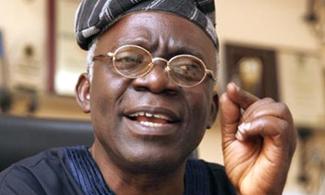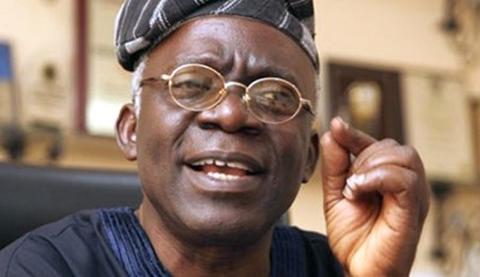
The charges LD/2415C/16 (Federal Republic of Nigeria v Gnahoue Sourou Nazaire and two others) and LD/6147/2017 (Federal Republic of Nigeria v Gnahoue Sourou Nazaire and another) are both pending at the Lagos State High Court.
Human rights lawyer, Femi Falana, has asked the Justice Ayo Salami-led Presidential Panel investigating allegations of gross misconduct against the suspended Acting Chairman of the Economic and Financial Crimes Commission, Ibrahim Magu, not to recommend the termination of forgery charges against a businessman from Republic of Benin, Granhoue Sourou Nazaire, and two others.
The charges LD/2415C/16 (Federal Republic of Nigeria v Gnahoue Sourou Nazaire and two others) and LD/6147/2017 (Federal Republic of Nigeria v Gnahoue Sourou Nazaire and another) are both pending at the Lagos State High Court.
Falana in a letter on behalf of his client, Madam Rachidatou Abdou, to the panel, claimed the defendants in the case recently submitted a petition to the panel where they falsely claimed that Magu abused his office by charging them with forgery and stealing on the basis of a petition written by Abdou.

The lawyer said the review of the criminal cases pending before the Lagos High Court was not covered by any of the terms of reference listed in the instrument setting up the judicial commission headed by Salami.
He said, “It is submitted that the Tribunal of Inquiry Act is not a law of general application in the country. Our authority for this submission is the case of Fawehinmi v. Babangida (2003) 12 WRN 1 where the Supreme Court held that, “the power to make a general law for the establishment and regulation of tribunals of inquiry in the form of the Tribunals of Inquiry Act 1966 is now a residual power under the 1999 constitution belonging to the states. However, in regard to the Federal Capital Territory Abuja, the power resides in the National Assembly”. Since the evidence of the defendants pertain to the criminal activities carried out by them in Lagos State, the President is not competent to authorise the Honourable Judicial Commission to investigate them.
“Notwithstanding that the Honourable Judicial Commission is headed by a retired President of the Court of Appeal, it is an inferior tribunal which is subject to the jurisdictional supervision and control of a high court. To that extent, the Honourable Judicial Commission lacks the competence to review the criminal cases that are pending before the Lagos State High Court. In Williams v Dawodu (1988) 4 NWLR (Pt 87) 189 the Court of Appeal held that section 14(2) of the Lagos State Tribunal of Inquiry Law which purported to upgrade the recommendation of a tribunal to that of a high court is contrary to the judicial powers vested in the courts by section 6 of the constitution.
“By denying our client the opportunity to challenge the evidence adduced by the defendants the Judicial Commission has infringed on her fundamental right to fair hearing and departed from the principles established by the Supreme Court in Garba v University of Maiduguri (1986) 1 NWLR (Pt 18) 550 at 558 where Oputa JSC held that "To constitute a fair hearing whether it be before the regular courts or before Tribunals and Boards of Inquiry the person accused should know what is alleged against him. He should be present when any evidence against him is tendered and he should be given a fair opportunity to correct or contradict such evidence?"
“The power of the EFCC to prosecute the defendants for economic crimes on the authority of the Attorney-General of Lagos State cannot be questioned by the Judicial Commission. In Frank Amah v Federal Republic of Nigeria (2019) 6 NWLR (Pt 1667) 160 at 188 Kekere-Ekun JSC stated that “The presumption which has not been rebutted, is that the EFCC has the requisite authority, donated by the Attorney-General of Lagos State, to prosecute the appellant for offences allegedly committed under the Criminal Code Law of Lagos State. The authority cannot be questioned. As rightly held by the lower court, this court has taken judicial notice of the fact of the delegation, which is binding on all".
“As a fact-finding body this Honourable Judicial Commission is not competent to determine the guilt or otherwise of the defendants who are currently standing trial in the Lagos State High Court. This principle was laid down by the Supreme Court in Dr. Sofekun v Akinyemi (1981) 1 NCLR 135 wherein Obaseki said that "It is in the interest of the Government and every individual in this country that the guilt of crime should not be tagged on any individual without a proper trial in the courts of law known as such under the constitution of the Federal Republic of Nigeria".
“The Honourable Judicial Commission lacks the power to request the President to order the Attorney-General of the Federation to terminate the criminal proceedings arising from the contravention of the Criminal Code of Lagos State. It is trite law that the Attorney-General of the Federation is not subject to the control or directive of the President or any authority whatsoever in the exercise of the power to terminate any criminal case under section 174 of the constitution. See The State v Ilori (1983) 1SCNLR 94 at 111. However, since the defendants have been charged under the Criminal Law of Lagos State it is the Attorney-General of Lagos State who is empowered by section 211 of the Constitution to terminate the pending criminal cases pending before the Lagos State High Court in accordance with the principles of law enunciated by the Supreme Court in the case of Anyebe v The State (1986) 1 MWLR (Pt 14) 39.
“It is equally submitted that the Honourable Judicial Commission lacks the vires to review the criminal cases pending in the Lagos State High Court as the President who constituted it has no control over the subject matter. Furthermore, the Attorney-General of Lagos State who authorised the EFCC to initiate the criminal proceedings is not an agent of the President. In Gafar v Government of Kwara State (2007) 20 WRN 170 the Supreme Court held that “the Federal High Court lacked the jurisdictional competence to entertain the appellant's application for the enforcement of his fundamental rights as the 1st respondent "which constituted the Commission of Inquiry and issued a White Paper on the report thereof, is not an agency of the Federal Government." Incidentally, the Judicial Commission of Inquiry in the Gafar's case was headed by Ayo Salami JCA (as he then was).
“In view of the foregoing and having regards to the fact that the constitutional democracy operated in the country rests squarely on the principle of separation of powers, we urge the Honourable Judicial Commission of Inquiry to refrain from further reviewing the criminal cases pending in the Lagos State High Court. In particular, the Honourabe Judicial Commission should reject the dangerous invitation of the defendants to constitute itself into an appellate court over the Lagos State High Court. However, if our humble prayer is refused for any reason whatsoever we shall not hesitate to approach the Federal High Court with a view to quashing the proceedings of this Honourable Judicial Commission of Inquiry for reviewing criminal cases that are pending before the Lagos State High Court.”